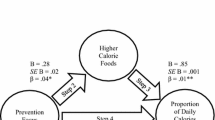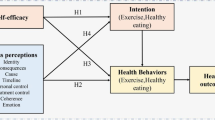Abstract
In this set of studies an attempt was made to distinguish between disease detection and health promotion behaviors. Disease detection behaviors were defined as behaviors designed to detect physical pathology (e.g., cholesterol check) and health promotion behaviors were defined as behaviors that may directly improve health (e.g., eating a low-fat diet). It was proposed that the decision to engage in detection behaviors is associated more with affect and that the decision to engage in promotion behaviors is associated more with cognition. Two studies were conducted to test this hypothesis. In Study 1 participants' affective and cognitive responses to five detection behaviors and five promotion behaviors were measured. Consistent with our hypothesis, detection behaviors were associated with more affective responses. Study 2 used a different procedure to measure affect and cognition and replicated the findings of Study 1. In addition, Study 2 examined how promotion and detection behaviors respond to information and emotional persuasive messages.
Similar content being viewed by others
References
Abelson, R. P., Kinder, D. R., Peters, M. D., and Fiske, S. T. (1982). Affective and semantic components in political person perception.J. Personal. Soc. Psychol. 42: 619–630.
Ajzen, I., and Fishbein, M. (1977). Attitude-behavior relations: A theoretical analysis and review of empirical research.Psychol. Bull. 84: 888–918.
Ajzen, I., and Timko, C. (1986). Correspondence between health attitudes and behavior.Basic Appl. Soc. Psychol. 7: 259–276.
Becker, M. H., and Maiman, L. A. (1975). Sociobehavioral determinants of compliance with health and medical recommendations.Med. Care 13: 10–24.
Becker, M. H., Drachman, R. H., and Hirscht, J. P. (1972). Motivations as predictors of health behavior.Health Serv. Rep. 87: 852–862.
Becker, M. H., Kaback, M., Rosenstock, I., and Ruth, M. (1975). Some influences of public participation in genetic screening programs.J. Commun. Health 1: 3–14.
Belloc, N. B. (1973). Relationship of health practices and mortality.Prevent. Med. 2: 67–81.
Breckler, S. J. (1984). Empirical validation of affect, behavior, and cognition as distinct components of attitude.J. Personal. Soc. Psychol. 47: 1191–1205.
Breckler, S. J., and Wiggins, E. C. (1989). Affect versus evacuation in the structure of attitudes.J. Exp. Soc. Psychol. 25: 253–271.
Calnan, M. (1985). An evaluation of the effectiveness of a class teaching breast self-examination.Br. J. Med. Psychol. 58: 317–329.
Calnan, M., and Ruther, D. R. (1986). Do health beliefs predict health behavior? An analysis of breast self-examination.Soc. Sci. Med. 22: 673–678.
Crowne, D. P., and Marlowe, D. (1960). A new scale of social desirability independent of psychopathology.J. Consult. Psychol. 24: 349–354.
Davidson, P., and Davidson, S. (1980).Behavioral Medicine: Changing Health Life-Styles, Brunner/Mazel, New York.
Davidson, A. R., and Morrison, D. M. (1983). Predicting contraceptive behavior from attitudes. A comparison of within- versus across-subjects procedures.J. Personal. Soc. Psychol. 45: 997–1009.
Edwards, K. (1990). The interplay of affect and cognition in attitude formation and change.J. Personal. Soc. Psychol. 59: 202–216.
Epstein, S. (1983). Aggregation and beyond: Some basic issues on the prediction of behavior.J. Personal. 51: 360–392.
Epstein, S., and Fenz, W. (1967). The detection of areas of emotional stress through variations in perceptual threshold and physiological arousal.J. Exp. Res. Personal. 2: 191–199.
Fazio, R. H., and Zanna, M. P. (1981). Direct experience and attitude-behavior consistency. In Berkowitz, L. (ed.),Advances in Experimental Social Psychology, Vol. 14, Academic Press, New York, pp. 161–202.
Fleming, D. (1967). Attitude: The history of a concept.Perspect. Am. Hist. 1: 287–365.
Grady, K. E. (1984). Cue enhancement and the long-term practice of breast self-examination.J. Behav. Med. 7: 191–204.
Greenwald, A. G. (1968). Cognitive learning, cognitive response to persuasion, and attitude change, in Greenwald, A. G., Brock, T. C., and Ostrom, T. M. (eds.),Psychological Foundations of Attitudes, Academic Press, New York, pp. 148–170.
Harris, D. M., and Guten, S. (1979). Health-protective behavior: An exploratory study.J. Health Soc. Behav. 20: 17–29.
Hecker, B. L., and Ajzen, I. (1983). Improving the prediction of health behavior: An approach based on the theory of reasoned action.Acad. Psychol. Bull. 5: 11–19.
Hobbs, P., Haran, D., Pendleton, L., Jones, B., and Posner, T. (1984). Public attitudes and cancer education.Int. Rev. Appl. Psychol. 33: 565–586.
Janis, I. L., and Feshbach, S. (1953). Effects of fear-arousing communications.J. Abnorm. Soc. Psychol. 48: 78–92.
Janz, N. K., and Becker, M. H. (1984). The health belief model: A decade later.Health Educ. Q. 11: 1–42.
Kasl, S. V., and Cobb, S. (1966). Health behavior, illness behavior, and sick-role behavior.Arch. Environ. Health 12: 246–266.
Kirscht, J. P. (1983). Preventive health behavior: A review of research and issues.Health Psychol. 2: 277–301.
Kirscht, J. P., and Rosenstock, I. (1977). Patient adherence to antihypertensive medical regimens.J. Commun. Health 3: 115–124.
Kirscht, J. P., and Rosenstock, I. (1979). Patients' problems in following recommendations of health experts. In Stone, G., Cohen, F., and Adler, N. (eds.),Health Psychology: A Handbook, Jossey-Bass, San Francisco, pp. 189–216.
Koop, C. (1983). Perspectives on future health care.Health Psychol. 2: 303–312.
Kramer, B. M. (1949). Dimensions of prejudice.J. Psychol. 27: 389–451.
Langlie, J. (1977). Social networks, health beliefs, and preventative health behavior.J. Health Soc. Behav. 18: 244–260.
Lau, R., Kane, R., Berry, S., Ware, J., and Roy, D. (1980). Channeling health: A review of televised health campaigns.Health Educ. Q. 7: 56–89.
Leventhal, H. (1970). Findings and theory in the study of fear communications. In Berkowitz, L. (ed.),Advances in Experimental Social Psychology, Vol. 5, Academic, New York, pp. 119–186.
Leventhal, H., and Cameron, L. (1987). Behavioral theories and the problem of compliance.Patient Educ. Counsel. 10: 117–138.
Leventhal, H., Safer, M. A., and Panagis, D. M. (1983). The impact of communications on the self-regulation of health beliefs, decisions, and behavior.Health Educ. Q. 10: 3–29.
Leventhal, H., Nerenz, D. R., and Steele, D. J. (1984). Illness representations and coping with health threats. In Baum, A., and Singer, J. (eds.),A Handbook of Psychology and Health, Erlbaum Associates, Hillsdale, NJ, pp. 219–252.
Marston, M. (1970). Compliance with medical regimens: A review of the literature.Nurs. Res. 19: 312–323.
Millar, M. G., and Millar, K. U. (1990). Attitude change as a function of attitude type and argument type.J. Personal. Soc. Psychol. 59: 217–218.
Millar, M. G., and Tesser, A. (1986). Effects of affective and cognitive focus on the attitude-behavior relation.J. Personal. Soc. Psychol. 51: 270–276.
Millar, M. G., and Tesser, A. (1989). The effects of affective-cognitive consistency and thought on the attitude-behavior relation.J. Exp. Soc. Psychol. 25: 189–202.
Mitchell, J. (1974). Compliance with medical regimen: An annotated bibliography.Health Educ. Monogr. 2: 75–87.
Norman, R. (1975). Affective-cognitive consistency attitudes, conformity, and behavior.J. Personal. Soc. Psychol. 32: 83–91.
Ostrom, T. M. (1969). The relationship between the affective, behavioral, and cognitive components of attitude.J. Exp. Soc. Psychol. 5: 12–30.
Owens, R. G., and Heron, J. D. (1987). Psychological and social characteristics of attenders for breast screening.Psychol. Health 1: 303–313.
Pallak, S. R., Murroni, E., and Koch, J. (1983). Communicator attractiveness and expertise, emotional versus rational appeals, and persuasion: A heuristic versus systematic processing interpretation.Soc. Cognit. 2: 122–141.
Petty, R. E., Cacioppo, J. T., and Goldman, R. (1981). Personal involvement as a determinant of argument-based persuasion.J. Personal. Soc. Psychol. 41: 847–855.
Rosenberg, M. J. (1956). Cognitive structure and attitudinal affect.J. Abnorm. Soc. Psychol. 53: 367–372.
Rosenberg, M. J. (1960). A structural theory of attitude dynamics.Public Opin. Q. 24: 319–341.
Rosenstock, I. (1966). Why people use health services.Milbank Ment. Fund Q. 44: 94–124.
Rosenstock, I. (1974). The health belief model and preventive health behavior.Health Educ. Monogr. 2: 354–386.
Tesser, A. (1988). Toward a self-evaluation maintenance model of social behavior. In Berkowitz, L. (ed.),Advances in Experimental Social Psychology, Vol. 21, Academic Press New York, pp. 181–227.
Tesser, A., and Collins, J. (1988). Emotion in social reflection and comparison situations: Intuitive, systematic, and exploratory approaches.J. Personal. Soc. Psychol. 55: 695–709.
Tesser, A., and Shaffer, D. (1990). Attitudes and attitude change. In Rosenzweig, M., and Porter, L. (eds.),Annual Review of Psychology, Vol. 41, Annual Reviews, Palo Alto, CA, pp. 479–523.
Thurstone, L. L. (1928). Attitudes can be measured.Am. J. Sociol. 33: 529–544.
Weisenberg, M., Kegeles, S. S., and Lund, A. K. (1980). Children's health beliefs and acceptance of a dental preventive activity.J. Health Soc. Behav. 21: 59–74.
Wilson, T. D., Dunn, D. S., Bybee, J. A., Hyman, D. B., and Rotondo, J. A. (1984). Effects of analyzing reasons on attitude-behavior consistency.J. Personal. Soc. Psychol. 47: 4–16.
Wilson, T. D., Dunn, D. S., Kraft, D., and Lisle, D. J. (1989). Introspection, attitude change in attitude-behavior consistency: The disruptive effects of explaining why we feel the way we do. In Berkowtiz, L. (ed.),Advances in Experimental Social Psychology, Vol. 19, Academic Press, Orlando, FL, pp. 123–205.
Wu, C., and Shaffer, D. R., (1987). Susceptibility to persuasive appeals as a function of source credibility and prior experience with the attitude object.J. Personal. Soc. Psychol. 52: 677–688.
Zanna, M. P., and Rempel, J. K. (1988). Attitudes: A new look at an old concept. In Bar-Tal, D., and Kruglanski, A. (eds.),The Social Psychology of Knowledge, Cambridge University Press, New York.




